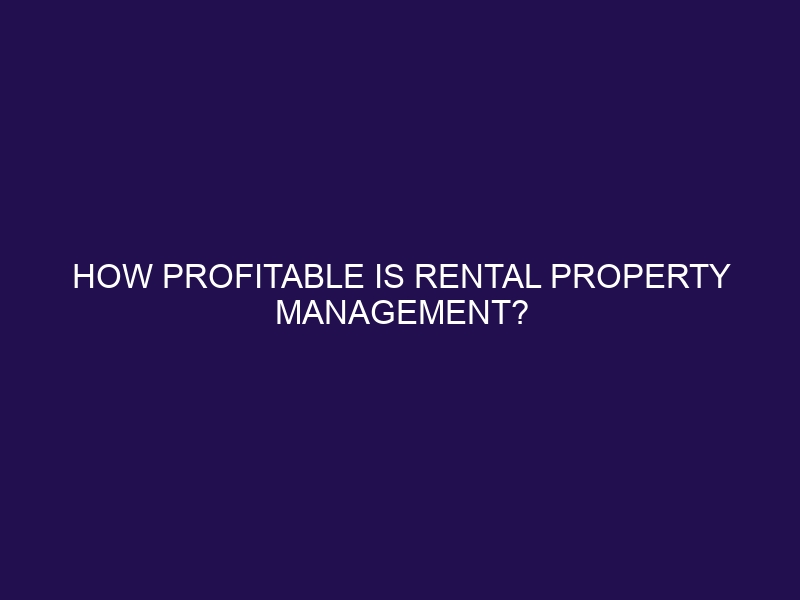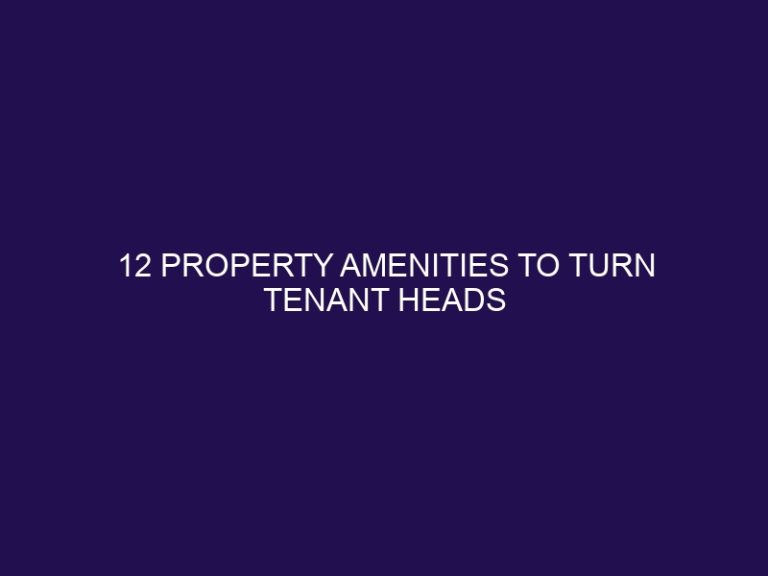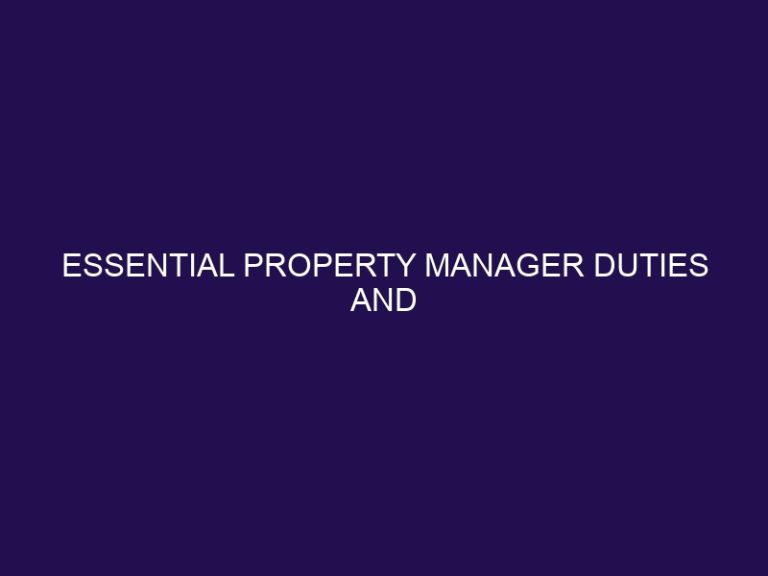How Profitable is Rental Property Management?
Rental property management plays a crucial role in the real estate industry, handling the oversight and maintenance of residential or commercial properties on behalf of the property owner. It involves a range of responsibilities, from property acquisition and marketing to tenant screening, lease agreements, rent collection, property maintenance, and tenant relations.
Within the realm of rental property management, there are several aspects that contribute to its profitability. These include consistent rental income, decreased vacancy rates, access to professional expertise, and effective time and stress management.
On the other hand, there are challenges and potential drawbacks to rental property management, such as the initial investment and expenses, dealing with tenant hassles and evictions, property damage and repairs, and navigating legal and regulatory requirements.
The profitability of rental property management is influenced by various factors. The location and quality of the property are important determinants, as properties in high-demand areas and in good condition generally yield higher returns. Rental market conditions and property management fees can impact profitability.
Considering both the advantages and challenges, it is essential to evaluate the specific circumstances and factors that contribute to the profitability of rental property management. By assessing these aspects, investors can make informed decisions about whether rental property management is a viable and profitable investment option for them.
What Is Rental Property Management?
Rental property management, also known as property management, is the process of overseeing and operating real estate properties that are leased to tenants. Property managers are responsible for a wide range of tasks, which include marketing vacant units, carefully screening potential tenants, collecting rent, maintaining the property in good condition, and promptly addressing any concerns raised by tenants. To excel in rental property management, one must possess exceptional organizational and communication skills, in addition to having a comprehensive understanding of the laws that govern the relationship between landlords and tenants. The management of rental properties can be a highly lucrative venture, as it offers the potential to generate a steady stream of rental income and increase in value over time. In fact, recent research reveals that rental properties can deliver an average annual return of 9.27%.
How Does Rental Property Management Work?
Are you curious about how rental property management actually works? In this section, we’ll take a deep dive into the ins and outs of this complex field. From property acquisition and marketing techniques to tenant screening and selection, lease agreements and rent collection, property maintenance and repairs, and even tenant relations and conflict resolution – we’ll cover it all. Get ready to uncover the secrets behind effective rental property management and discover the factors that contribute to its profitability.
Property Acquisition and Marketing
- Research the local market to identify potential properties for property acquisition and marketing.
- Conduct property inspections and assessments to determine their suitability for rental purposes and property acquisition and marketing.
- Develop a marketing strategy to attract potential tenants and facilitate property acquisition and marketing, including online listings, signage, and advertising.
- Create visually appealing and informative property listings with high-quality photos and detailed descriptions to support property acquisition and marketing efforts.
- Utilize different advertising channels, such as social media, real estate websites, and local publications, to reach a wider audience for property acquisition and marketing.
- Screen and select qualified tenants by conducting background checks, verifying employment, and checking references to ensure effective property acquisition and marketing.
- Prepare and negotiate lease agreements that clearly outline tenant responsibilities and rent payment terms for successful property acquisition and marketing.
- Hold open houses, property viewings, and virtual tours to showcase the rental property to potential tenants and support property acquisition and marketing.
- Maintain regular communication with tenants and promptly address any concerns or issues to enhance property acquisition and marketing activities.
Tenant Screening and Selection
- The process of tenant screening and selection is a critical aspect of rental property management that helps to ensure reliable tenants and minimize risks.
- Application: Prospective tenants submit applications providing personal and financial information.
- Background Check: Verify tenant details including employment history, credit score, and criminal records.
- Reference Check: Contact previous landlords to assess the tenant’s rental history and behavior.
- Income Verification: Confirm the tenant’s ability to pay rent by requesting income documents.
- Interview: Conduct an interview to gauge the tenant’s suitability and address any concerns.
- Decision: Evaluate all information gathered and make an informed decision on whether to accept or reject the tenant.
By following these steps, rental property managers can effectively perform tenant screening and selection, ensuring that they choose tenants who are trustworthy, responsible, and likely to fulfill their rental obligations.
Lease Agreement and Rent Collection
Lease agreement and rent collection are crucial aspects of rental property management that ensure a smooth and profitable operation. A well-drafted lease agreement protects both the landlord and the tenant by clearly defining the terms and conditions of the tenancy. Rent collection should be streamlined and efficient, ensuring timely payments from tenants. Effective rent collection methods, such as online payment platforms and automated reminders, should be incorporated into the rental property management process.
I once managed a rental property where the lease agreement, which incorporated all necessary clauses, clearly stated that rent was due on the first of every month. To enhance the rent collection process, I implemented an online payment system and utilized automated reminders to inform tenants about upcoming payments. This not only eliminated the inconvenience of collecting checks in person but also significantly reduced the occurrence of late payments. The well-drafted lease agreement, combined with the efficient rent collection system, played a vital role in cultivating a positive landlord-tenant relationship and ensuring a consistent stream of rental income.
Property Maintenance and Repairs
Property maintenance and repairs are essential for effective rental property management. Landlords must prioritize maintaining their properties to attract and retain tenants while also minimizing the need for costly repairs in the future.
- Regular inspections: Conducting routine inspections is crucial to identify any maintenance issues early on, preventing them from escalating into significant problems.
- Prompt repairs: Timely addressing of maintenance requests and repairs not only ensures tenant satisfaction but also helps preserve the value of the property.
- Emergency response: Landlords should have a well-defined plan in place to handle emergency repairs, such as plumbing or electrical issues, in order to minimize any disruption experienced by tenants.
- Maintenance budget: Allocating a portion of rental income specifically for maintenance and repairs guarantees the availability of funds when required.
- Contractor relationships: Developing reliable relationships with contractors can enable landlords to obtain high-quality repairs at reasonable prices.
Tenant Relations and Conflict Resolution
When it comes to rental property management, establishing and maintaining good tenant relations and effectively resolving conflicts is crucial. This involves proactively cultivating positive tenant relationships through open lines of communication and prompt addressing of tenant concerns. It is important to be fair in resolving disputes such as disputes over rental payments or property maintenance. Developing conflict resolution skills is essential in handling any disagreements that may arise. By timely and fair resolution of conflicts, landlords can ensure a positive rental experience for tenants and promote a harmonious living environment.
The Pros of Rental Property Management
Managing rental properties can be a lucrative venture, and in this section, we’ll uncover the numerous benefits that come with rental property management. Imagine consistent rental income, decreased vacancy rates, and the peace of mind in knowing that professional expertise is at your disposal. Not only does it provide a reliable revenue stream, but it also saves you time and alleviates the stress of dealing with tenant-related issues. Get ready to discover the advantages that await in the world of rental property management.
Consistent Rental Income
Consistent rental income is a significant advantage of rental property management. There are several factors that contribute to maintaining this stable cash flow:
-
Employing effective marketing strategies to attract quality tenants.
-
Conducting thorough tenant screening to find reliable and responsible renters.
-
Utilizing well-drafted lease agreements that clearly outline rent payment terms.
-
Implementing regular rent collection processes to ensure timely payments.
-
Prioritizing regular property maintenance and prompt repairs to keep tenants satisfied and minimize vacancies.
In John’s case, as a property owner, he made the decision to hire a property management company. By implementing a comprehensive marketing plan and conducting a thorough tenant screening process, John was able to enjoy a consistent rental income with minimal vacancies and reliable tenants. This provided him with financial stability and peace of mind.
Decreased Vacancy Rates
Decreased vacancy rates are a significant advantage of rental property management.
- Increased tenant retention: Effective property management strategies such as responsive maintenance, fair rent pricing, and good customer service can lead to satisfied tenants, ultimately contributing to lower vacancy rates and encouraging them to stay longer.
- Efficient marketing and tenant screening: Property managers leverage various advertising channels and conduct thorough screening processes to attract qualified tenants quickly, thus reducing the time the property remains unoccupied and contributing to decreased vacancy rates.
- Proactive lease renewal: Property managers actively work on renewing leases before they expire. This proactive approach minimizes vacancy periods, leading to decreased vacancy rates and ensuring a consistent rental income stream.
- Prompt turnover process: When a tenant does move out, property managers strive to minimize the time between tenants, efficiently coordinating cleaning, repairs, and marketing to fill the vacancy promptly. By doing so, they contribute to decreased vacancy rates and ensure a smooth rental process.
Professional Expertise
Rental property management heavily relies on the incorporation of professional expertise. Property managers possess the necessary knowledge and experience to proficiently handle tasks like tenant screening, lease agreements, property maintenance, and conflict resolution. Their expertise guarantees efficient management of rental properties, minimizing vacancies, and maximizing rental income. Additionally, property managers stay abreast of legal and regulatory requirements, mitigating potential risks for property owners. By seeking their professional guidance, property owners can effortlessly navigate the complexities of rental property management, saving time and avoiding unnecessary stress. Consequently, acquiring professional expertise is indispensable for achieving success in rental property management.
Time and Stress Management
Effective time and stress management is crucial for successful rental property management. Here are some practical steps to assist you in effectively managing your time and reducing stress in this role:
-
Create a schedule: Plan and organize your tasks, including property inspections, maintenance, and tenant communication.
-
Delegate tasks: Entrust responsibilities such as repairs and bookkeeping to professionals to save time and alleviate stress.
-
Automate processes: Make use of property management software to streamline tasks like rent collection, lease agreements, and maintenance requests.
-
Give importance to self-care: Take breaks, engage in regular exercise, and participate in activities that aid relaxation and rejuvenation.
-
Seek support: Connect with fellow property managers or join industry groups to seek guidance and gain support.
Pro-tip: Always establish boundaries and strive for a healthy work-life balance to prevent burnout and enhance overall productivity.
The Cons of Rental Property Management
Tackling the less glamorous side of rental property management, we dive into the cons that await landlords. From the daunting initial investment and ongoing expenses to tenant hassles, evictions, and property damage, challenges are aplenty. Legal and regulatory hurdles further complicate matters. Brace yourself for a dose of reality as we explore the flip side of the coin in this no-nonsense discussion. And remember, while the rewards can be bountiful, there’s no denying the potential pitfalls.
Initial Investment and Expenses
Investing in rental property management requires careful consideration of the initial investment and ongoing expenses involved. Here is a list of factors to consider:
- Property purchase: The initial investment, including the cost of purchasing the property, varies depending on location and property type.
- Renovations and repairs: Expenses may be necessary to make the property appealing and safe for tenants.
- Property taxes and insurance: These ongoing expenses are essential for protecting the investment and ensuring compliance with regulations.
- Maintenance and repairs: Regular maintenance and unexpected repairs can be costly, impacting profitability and adding to expenses.
- Mortgage payments: If financing the property, the monthly mortgage payments will impact cash flow and contribute to overall expenses.
True story: John invested in a rental property but underestimated the initial expenses. He had to dip into his savings to cover renovations and unexpected repairs, leading to a delay in generating rental income. John soon realized the importance of thoroughly assessing the initial investment and budgeting for expenses to ensure a profitable venture.
Tenant Hassles and Evictions
Tenant hassles and evictions can pose significant challenges in rental property management. Managing problematic tenants not only consumes a great deal of time but can also result in financial losses. The process of evictions can be both time-consuming and costly. Fortunately, there are strategies available to landlords that can help mitigate these issues. Thorough tenant screening and selection procedures can effectively identify reliable renters, thereby reducing the likelihood of conflicts arising. Additionally, clear and detailed lease agreements can provide a legal framework for resolving disputes that may arise. Maintaining regular communication with tenants is also crucial in order to address any concerns before they escalate into more serious problems. By implementing these strategies, landlords can successfully minimize tenant hassles and avoid evictions altogether, resulting in a smoother and more profitable rental property management experience.
Property Damage and Repairs
- Property damage and repairs are unavoidable aspects of rental property management.
- It is crucial for property owners to be well-prepared for such situations to ensure the well-being of their investments.
- Here are some key points to consider when it comes to property damage and repairs:
- Maintenance and Inspections: Regular inspections and maintenance are essential for identifying potential issues and preventing them from escalating.
- Emergency Fund: Allocating funds for unexpected repairs enables prompt action in case of unforeseen damage.
- Insurance Coverage: Sufficient insurance coverage safeguards property owners from financial burdens associated with major repairs.
- Timely Repairs: Promptly addressing repairs not only extends the lifespan of the property but also enhances tenant satisfaction.
One property owner experienced a significant plumbing issue in their rental unit caused by an accidental act of the tenant. Fortunately, the owner had prepared for such incidents and immediately contacted a reliable plumber to resolve the problem within a day. This quick response not only prevented further damage but also earned the trust and appreciation of the tenant, resulting in a long-lasting and positive landlord-tenant relationship.
Legal and Regulatory Challenges
When it comes to rental property management, dealing with legal and regulatory challenges is a must. Property owners should be aware that these challenges may vary depending on the location and the specific regulations in place. Here are some essential key points to consider:
- Compliance: Staying compliant with local, state, and federal laws regarding rental properties is crucial. This includes adhering to fair housing laws, safety regulations, and proper eviction procedures.
- Tenant rights: Landlords must familiarize themselves with the rights of their tenants, such as privacy rights, the right to quiet enjoyment, and timely repairs.
- Lease agreements: Creating legally binding lease agreements that protect both the landlord and tenant is essential to avoid any potential legal disputes.
- Discrimination: Landlords need to ensure that they do not discriminate against potential tenants based on protected characteristics, such as race, gender, or disability status.
- Code violations: Property owners must promptly address any building code violations to avoid legal consequences and ensure the safety of their tenants.
Being aware of and effectively addressing these legal and regulatory challenges is vital for successful rental property management. It helps landlords maintain a positive relationship with tenants, avoid legal issues, and protect their valuable investment.
Factors That Affect Profitability
When it comes to rental property management, profitability is the ultimate goal. In this section, we’ll explore the factors that directly impact the bottom line. From the location and quality of the property to the rental market conditions and property management fees, we’ll uncover how each of these elements can make or break the profitability of your rental venture. Get ready to delve into the key determinants that can skyrocket your returns or leave you struggling to break even.
Location of the Property
The location of the property plays a crucial role in the profitability of rental property management. A prime location with high demand and limited supply ensures consistent rental income and low vacancy rates. Areas near universities or business districts tend to attract more tenants. Considering the neighborhood’s safety, accessibility to amenities, and proximity to transportation can affect rental prices and property value. Researching the rental market conditions and trends in a specific location helps make informed decisions. Remember, a good location can offset other property challenges and maximize potential returns.
Pro-tip: Before investing, visit the area at different times of the day to gauge noise levels, traffic, and overall ambiance.
Quality of the Property
The quality of the property is a crucial factor in rental property management. Investing in a well-maintained and desirable property can lead to higher rental income and attract reliable tenants. Here are some key aspects to consider when evaluating the quality of a property:
- Location: A property in a desirable neighborhood with amenities and good infrastructure is more likely to attract tenants.
- Condition: Ensure that the property is in good condition, with well-maintained interiors, functioning appliances, and no structural issues.
- Features and amenities: Properties with desirable features like updated kitchens, modern bathrooms, and amenities such as parking, laundry facilities, or outdoor spaces can command higher rent.
- Safety and security: Tenants prioritize properties in safe neighborhoods with secure entry systems and adequate lighting.
Choosing a property with good quality can lead to higher tenant satisfaction, longer lease durations, and ultimately, a more profitable investment.
Rental Market Conditions
To accurately assess the profitability of rental property management, it is crucial to thoroughly analyze the rental market conditions. Various factors, such as supply and demand, population growth, and economic trends, have a significant impact on the rental market. In a competitive market where demand is high and supply is low, rental property management can prove to be highly profitable. This is due to increased rental rates and low vacancy rates. On the other hand, in an oversaturated market with an abundance of supply and limited demand, the profitability of rental property management may be affected. This can lead to lower rental rates and higher vacancy rates. Thus, it is essential to conduct comprehensive market research and analysis to understand the current rental market conditions. Additionally, it is advisable to consider investing in areas experiencing population growth and job opportunities as they can provide greater profitability. Staying up-to-date with economic trends and changes in the rental market is also crucial in making informed decisions. Developing strategies to attract and retain quality tenants in competitive rental markets is another key aspect. Finally, regularly evaluating and adjusting rental rates based on market conditions is essential in order to maximize profitability.
Property Management Fees
When deciding whether to hire a property management company, it is important to consider property management fees. These fees can vary depending on the company and the services provided, typically ranging from 8% to 12% of the monthly rental income. There are several factors to consider when evaluating property management fees:
– Services included: It is crucial to determine what services are included in the fee, such as advertising, tenant screening, rent collection, and maintenance.
– Comparative analysis: Compare fees from different property management companies to ensure you are receiving a fair price for the services provided.
– Property size and location: The fees charged can be influenced by the size and location of your property, as larger and more complex properties often incur higher fees.
– Experience and expertise: Property management companies with a strong track record and extensive experience may command higher fees.
– Additional fees: To have a complete understanding of the costs involved, it is important to inquire about any additional fees that may be charged, such as leasing or vacancy fees.
Considering all these factors will help you make an informed decision when it comes to property management fees.
Is Rental Property Management a Profitable Investment?
Is Rental Property Management a Profitable Investment?
Rental property management is indeed a profitable investment if approached strategically. Here are some key factors to consider:
- – Rental demand: It is crucial to conduct thorough research on the local market to ensure that there is a stable demand for rental properties in the area.
- – Rental rates: It is essential to analyze the rental rates in the vicinity in order to set competitive prices that guarantee a steady cash flow.
- – Operating expenses: All potential expenses, including property maintenance, utilities, insurance, and property management fees, should be carefully calculated.
- – Vacancy rate: One should aim to minimize vacancy periods by effectively marketing the property and maintaining good tenant relations.
- – Property appreciation: It is important to take into account the potential for long-term value growth in the area.
By carefully evaluating these factors, one can determine that rental property management is indeed a profitable investment.
Frequently Asked Questions
1. How profitable is the rental property management business?
Property management can be profitable, especially if you have multiple rental properties. By charging fees for services like tenant screening, rent collection, and maintenance coordination, property management companies can generate income. However, it’s essential to consider expenses such as advertising, office rent, legal fees, and continuing education costs.
2. How can property management companies make money?
Property management companies make money by charging fees for their services. The most common fee is the property management fee, which covers tasks like rent collection, property inspections, and tenant communication. The fee structure should be clearly defined and can vary based on factors like property type, size, and location.
3. Is it necessary to hire a property management team?
Hiring a property management team is not necessary for every landlord, but it can be beneficial, especially for those with multiple rental properties. A good property management team can handle day-to-day operations, freeing up time for landlords to focus on expanding their rental portfolio and reducing vacancies through effective marketing.
4. What factors should be considered when hiring a property management team?
When hiring a property management team, it’s important to consider their local expertise, licenses and certifications, reviews and references, terms and fees, and organization and technology. The team should have a deep understanding of the local market, laws and licensing requirements, and strong vendor relationships for efficient marketing and maintenance.
5. What are the typical day-to-day operations handled by property management companies?
Property management companies handle various day-to-day operations, including rental marketing, tenant screening, rent collection, repairs and maintenance, property inspections, move-in/move-out reports, legal eviction procedures, and business accounting. These tasks alleviate the stress and responsibilities of running a rental business for landlords.
6. How many rental units do you need to make a living as a property manager?
To make a living as a property manager, the number of rental units required can vary. Assuming an average fee of 10% of rents, with average rents of $500, one would need approximately 50 units to generate a gross income of $55,000 per year. However, it’s important to consider expenses and assess whether charging enough is feasible for profitability.







